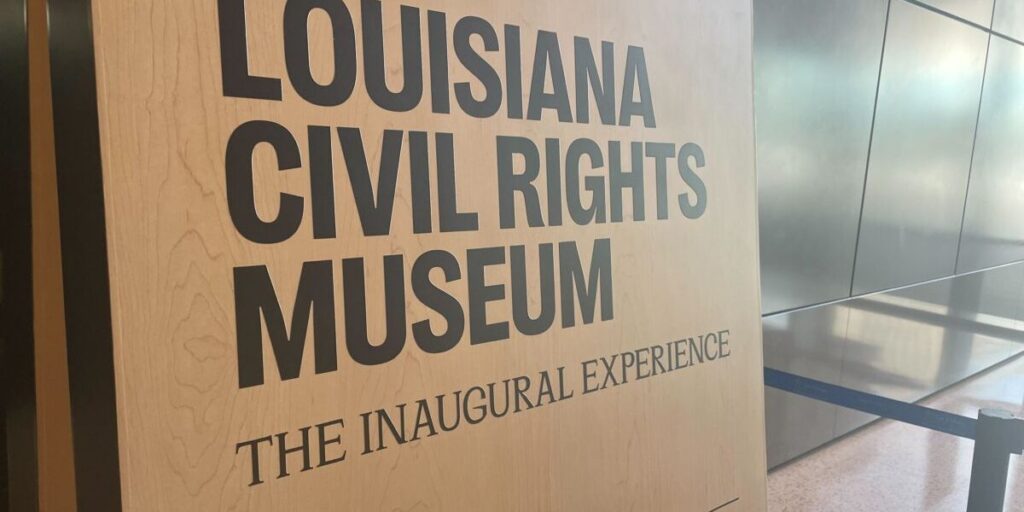Louisiana’s rich history is woven with stories of struggle, resilience, and triumph, especially when it comes to the fight for civil rights. From the impact of slavery to the long road of desegregation, the state has been at the center of many pivotal moments in America’s racial justice movement.
Across Louisiana, there are historic sites that not only tell the stories of those who fought for equality but also invite future generations to reflect on the legacy of these battles. Below, we explore seven historic locations in Louisiana that bring the state’s civil rights history to life.
1. Whitney Plantation (Wallace, LA)
The Whitney Plantation stands as a powerful reminder of the painful history of slavery. As the only plantation museum in Louisiana dedicated solely to the experience of enslaved African Americans, Whitney Plantation offers a unique and often overlooked perspective.
Visitors can tour the grounds and view exhibits that detail the lives of enslaved people and their struggles. The museum’s restored buildings, memorials, and the Wall of Honor dedicated to the names of enslaved individuals offer profound insights into how the legacy of slavery shaped the state’s social fabric.
2. The Louisiana Civil Rights Museum (New Orleans, LA)
The Louisiana Civil Rights Museum is an essential stop for anyone wishing to understand the state’s complex racial history. Located in New Orleans, the museum chronicles the evolution of the civil rights movement in Louisiana, highlighting the activism and legal battles that shaped racial equality in the state. The museum is home to a variety of exhibits that cover the fight against segregation, voter disenfranchisement, and the advocacy for equal rights for African Americans. It’s a moving tribute to the individuals and organizations that played pivotal roles in this crucial chapter of American history.
3. The A.P. Tureaud House (New Orleans, LA)
The A.P. Tureaud House in New Orleans represents the life and legacy of one of the most influential civil rights attorneys in Louisiana. A.P. Tureaud was a key figure in the legal battles that helped to desegregate public schools in the state. The house, now a historical site, stands as a testament to his tireless work and dedication to ensuring justice for African Americans in the face of systemic racism. The house is a symbol of the ongoing fight for equality and serves as a place to honor his contributions to the legal victories of the civil rights movement.
4. Dillard University (New Orleans, LA)
Ford Muscle Texas 10 Makes Its Grand Entrance at Mustang Week Texas 2025
Dillard University, a historically Black college and one of the oldest in Louisiana, has played a significant role in the civil rights movement. Many of the state’s most prominent civil rights leaders and activists were educated at Dillard, which served as a hub for organizing protests, demonstrations, and dialogues about race. The university’s commitment to social justice continues to this day, with programs that honor its role in shaping the intellectual and activist landscape of the civil rights movement.
5. The St. John Baptist Church (New Orleans, LA)
The St. John Baptist Church in New Orleans has a long and proud history as a place of spiritual strength and community for African Americans. During the civil rights movement, the church served as a gathering place for activists and organizers. It provided a space for planning and mobilizing against racial discrimination and injustice. The church’s role in Louisiana’s civil rights movement is an essential part of understanding how religious institutions were central to the fight for racial equality in the 20th century.
6. The Free People of Color Museum (New Orleans, LA)
North Carolina Republicans Reintroduce Bill That Would Allow Lawsuits Against Sanctuary Cities
New Orleans was home to a significant population of free people of color, many of whom played crucial roles in shaping the city’s social and political structure. The Free People of Color Museum highlights the contributions of this group to Louisiana’s cultural history, focusing on their struggles with racial identity, class, and politics. It tells the story of how free Black individuals navigated complex racial dynamics, fought for their rights, and contributed to the civil rights movements of the 19th and 20th centuries.
7. The Ruby Bridges Foundation (New Orleans, LA)
Ruby Bridges is a name forever etched in the history of school desegregation. At just six years old, Bridges became the first African American child to attend an all-white public elementary school in the South, enduring hostility and threats as she walked through the doors of William Frantz Elementary School in New Orleans. The Ruby Bridges Foundation honors her courage and continues to educate the public about the challenges of segregation and the importance of diversity and tolerance in modern education. Visiting the foundation offers a deep dive into the historical and personal significance of Bridges’ groundbreaking role in desegregating schools.
Reflections on Louisiana’s Civil Rights Legacy
These seven historic locations in Louisiana provide a vital link to understanding the complex and often painful history of racial inequality and the ongoing fight for civil rights in the state. Each site offers a unique perspective on the struggles and victories that defined the civil rights movement in Louisiana and beyond. Through these locations, visitors can reflect on the contributions of those who fought for justice and gain a deeper appreciation for the progress still being made.
Exploring Louisiana’s civil rights sites is not just about honoring the past—it is also about inspiring the future. These places challenge us to continue the work of creating a more just and equitable society, reminding us that the fight for civil rights is ongoing and that each generation has a role to play.




More Stories
Discover the Legacy of Civil Rights in Louisiana Through These 7 Historic Locations
Discover the Legacy of Civil Rights in Louisiana Through These 7 Historic Locations
Discover the Legacy of Civil Rights in Louisiana Through These 7 Historic Locations